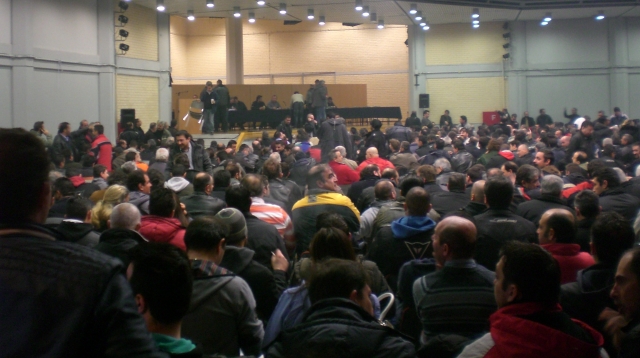Victoria Mindova
The trade union organization of the public railways company OSE has announced a 48-hour strike for Thursday 31 January and Friday 1 February. The strike actions are part of the mass protests of the public companies against the introduction of the single payroll table for the payment of salaries in the public sector. Port workers and employees in the health sector have announced a two-day strike at the same time as well whereas the trade union of the Greek Public Power Corporation DEI, GENOP, has also announced a 24-hour strike on Thursday.
On Tuesday morning, the trade union of public transport bus drivers gathered its members at a joint meeting to discuss how to continue the strike.
 More than four thousand bus drivers gathered in the "Peace and Friendship" gym hall to find a common position on whether to continue the five-day strike, which they had announced late last week or whether to stop it and to regroup. Bus drivers like the underground workers are threatened with civil mobilization if they do not obey the law and do not end the strike.
More than four thousand bus drivers gathered in the "Peace and Friendship" gym hall to find a common position on whether to continue the five-day strike, which they had announced late last week or whether to stop it and to regroup. Bus drivers like the underground workers are threatened with civil mobilization if they do not obey the law and do not end the strike.
On Monday morning, the Athens Court declared their strike illegal but the protesters did not suspend it. The government warned that it was not afraid to take extreme measures and impose civil mobilization if the public transport workers continue to strike despite the illegality of their protest.
The meeting of bus drivers lasted more than six hours but they did not reach a unanimous decision on what their next protest actions should be in order to avoid the civil mobilization but to continue fighting and to keep their salaries at the same time. The two main proposals among which the workers had to choose were whether to continue the active strike or temporarily suspend it.
The president of the union Leonidas Skoulos asked the workers to authorize him and the other 16 members of the management board to start negotiations with the government. They want to put on the table of negotiations the issue of keeping the collective labour agreement in their profession as well as the level of wages. Skoulos insisted that if bus drivers were persistent like the underground workers last week, the government would break up their protest by issuing civil mobilization summonses. The penalty for disobeying the summons to civil mobilization is three months in jail as an underground worker, who was forced to stop the strike actions and return to work, told GRReporter last week.
Leonidas Skoulos suggests that the workers should retreat from the active strike actions at least for now in order to allow the trade union leadership to enter into dialogue with the relevant ministry to find ways to keep the collective labour agreements. However, he and other union leaders believe that public bus drivers should support the general strike on 31 January and that a new general meeting should take place on 14 February.
The problem in one of the biggest trade unions, such as that of bus drivers, is that the majority of workers in the sector do not trust their trade union leaders. They believe that their rights will not be protected and want to continue the active strike regardless of the consequences that civil mobilization can bring. The more extreme voices in the trade union organization suggest that the strike should continue until the end of the week and if in the meantime the government puts into effect the measure to mobilize the protesters, occupations of depots in areas of the capital should be organized.
The debate over the future of the strike did not go without incidents. After about four hours of discussing the next steps of the drivers, the tension began growing and there were light skirmishes. The discussion was stopped twice to bring order to the room. Finally, the debate had to end with a vote by raising hands but it failed. The general secretary, who was in charge of the procedure, stated that he could not decide which of the two main proposals had gathered more votes. The trade union leadership suggested that the vote should be postponed for Friday this week, which was booed. The final decision was to hold the vote on Tuesday and the results are expected later in the evening.
In the meantime, Athens was left without buses on Tuesday.